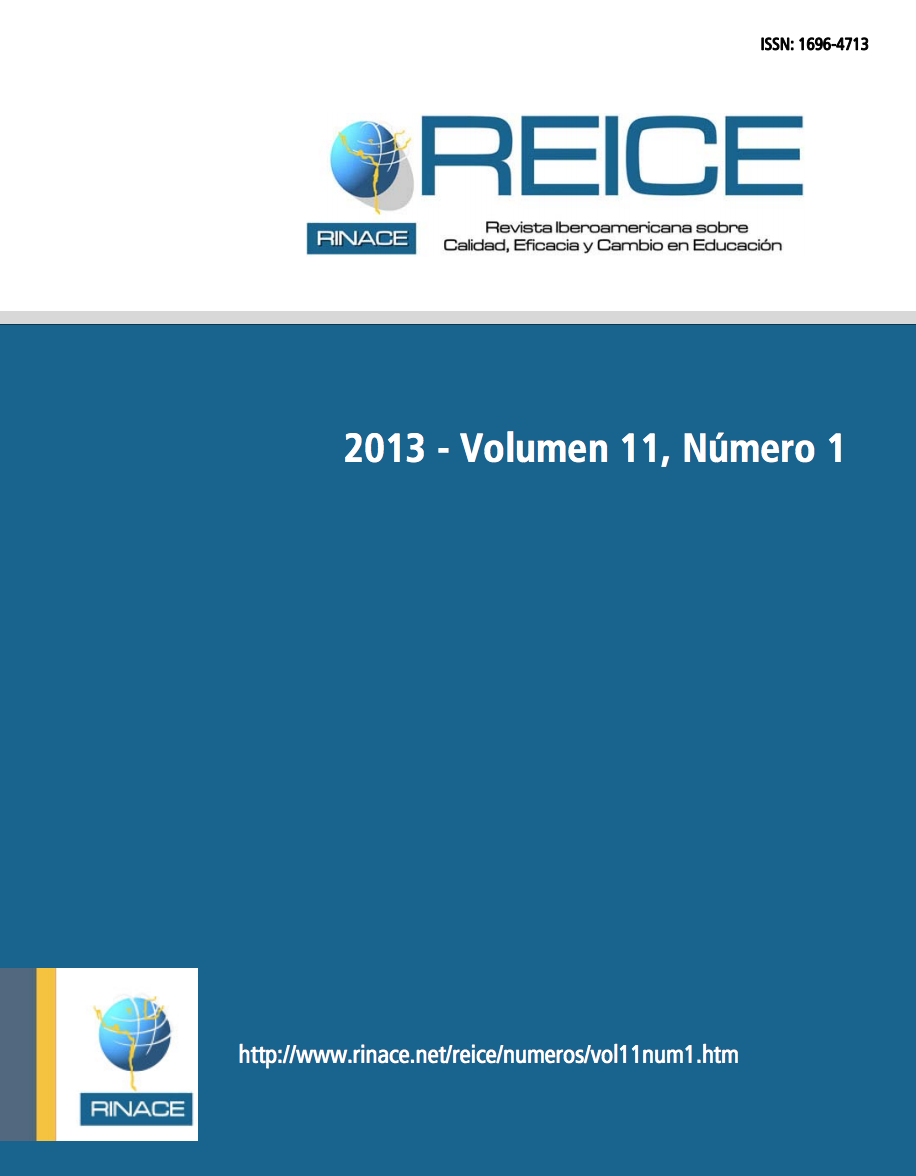Glance of a Professional Profile in Special Education in the Context of the Complexit
Keywords:
Special education, teacher educators, employers, professional profile, conceptual, procedural and attitudinal knowledgeCopyright (c) 2016 REICE. Revista Iberoamericana sobre Calidad, Eficacia y Cambio en Educación

This work is licensed under a Creative Commons Attribution-NonCommercial-NoDerivatives 4.0 International License.
Abstract
This article emerges as part of the self-assessment process in the framework of the second re-accreditation of the career of Especial Education with emphasis on Integration (CEEI), the Division of Basic Education (DEB), and the Center for Research and Teaching of Education (CIDE), of the National University of Costa Rica, for the National System of Accreditation for Higher Education (SINAES), in the year 2011. It has as an objective, to inform from the perspective of the teacher educators and employees graduated from the career, the valuation of the conceptual, procedural, and attitudinal knowledge for the output profile of the study plan. The methodology used at the time of this study was attended by a total of 15 trainers of the CEEI, who worked in the period 2006-2010, further; we had the collaboration of 27 employers and used to both actors a structured questionnaire with closed answers. Among the results, it's evident certain dissent between the valuation of both participants, element which counterproductively shows the necessity to propitiate intentional convergent spaces, in order to have a greater relevance of the curriculum. On the other hand, it determines the necessity of having conceptual and methodological clarity of the curricular tendency of the study plan by the academics team to promote greater coherence between the approach and execution, In addition to viewing critical positions and transformative in the diverse context, changing, uncertain and complex as the current socio-educational realities require.
Downloads
References
Aguerrondo, I (2002). Los desafíos de la política educativa relativos a las reformas de la formación docente, Trabajo presentado en la Conferencia “El desempeño de maestro en América Latina y el Caribe: Nuevas perspectivas” Brasil, Brasilia, 10 12 julio 2002.
Álvarez, A. (2005). Tres miradas a la formación docente. Altablero, 35. Disponible en http://www.mineducacion.gov.co/1621/article-89943.html
Bates, R. y otros (1989). Teoría crítica de la Administración educativa. Valencia: Servicio de publicaciones de la Universidad.
Comisión Nacional de Rectores (2008). Programa Estado de la Nación en Desarrollo Humano Sostenible. Segundo Estado de la Educación. San José, Costa Rica: CONARE.
Gallego, J. y Rodríguez A, 2007. Tendencias en la Formación Inicial del Profesorado en Educación Especial. Revista Electrónica Iberoamericana sobre Calidad Eficacia y Cambio en Educación (REICE). Vol. 5-N°3.
Hernández de Rincón, A. (2007). Parámetros para el diseño y evaluación del currículo crítico. Revista de Teoría y Didáctica de las Ciencias Sociales, 12, 51-82.
Ochoa, M. (2005). Tres miradas a la formación docente. Altablero N° 35 junio-julio2005. Disponible en http://www.mineducacion.gov.co/1621/article- 89943.
Roa, R. (2006). Formación de Profesores en el Paradigma de la Complejidad. Educación y Educadores, 9(1). Disponible en http://www.mineducacion.gov.co/1621/article-89943.html
Sayago, Z., Chacón Corzo, M. A. y Rojas de Rojas, M. (2008). Construcción de la identidad profesional docente en estudiantes universitarios. Educere, 12(42).
Tedesco, J, y Fanfani, E. (2002). Nuevos tiempos y Nuevos docentes. Conferencia Regional “El Desempeño de los Maestros en América Latina y el Caribe: Nuevas Prioridades”. UNESCO.
Universidad Nacional (2005). Plan de estudios de la carrera de Educación Especial con énfasis en integración. Centro de Investigación y Docencia en Educación. División de Educación Básica. Documento no publicado
